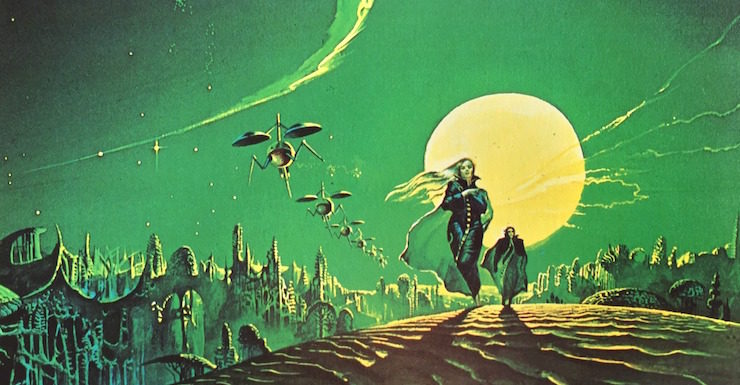The essence of a great science fiction or fantasy novel is the world. There, I said it. Feel free to disagree. But I haven’t fallen in love with a novel without first falling deep into the author’s imaginary world. So naturally it was the most extreme worlds that became my favorites. And in the hands of the best authors those unique worlds produced not only memorable places and stories, but fertile ground for things like social and political commentary as well. There is something to be said for taking things to their limits. In each of these novels the author has taken ideas about our humdrum world and pushed them to the extreme (as if I hadn’t already overused that word). In doing this, in seeing these exaggerated versions of our world, we are allowed glimpses of possible futures or of alternate versions of the present or even the past.
The Drowned World by J.G. Ballard
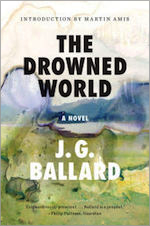 To grasp the significance of J.G. Ballard’s novel it’s important to remember that it was written in 1962 because it sounds like a novel that was written in the last few years. In fact, more than one book has been written in the last few years with a similar premise. The Drowned World was the first book I read in what I’ll call the “scientific expedition into an unknown world” genre. A kind of global warming has devastated the world. The polar ice caps are melted, flooding the northern hemisphere, transforming the land into something that resembles the Triassic period (now that’s extreme). But what’s truly great about The Drowned World is the way in which this transformation shapes and affects the characters. Our protagonist literally finds himself regressing into an earlier state, feeling more primitive and impulsive, devolved like his world. It’s a perfect of example of the interplay of character and environment and a keen commentary on the fragility of our society.
To grasp the significance of J.G. Ballard’s novel it’s important to remember that it was written in 1962 because it sounds like a novel that was written in the last few years. In fact, more than one book has been written in the last few years with a similar premise. The Drowned World was the first book I read in what I’ll call the “scientific expedition into an unknown world” genre. A kind of global warming has devastated the world. The polar ice caps are melted, flooding the northern hemisphere, transforming the land into something that resembles the Triassic period (now that’s extreme). But what’s truly great about The Drowned World is the way in which this transformation shapes and affects the characters. Our protagonist literally finds himself regressing into an earlier state, feeling more primitive and impulsive, devolved like his world. It’s a perfect of example of the interplay of character and environment and a keen commentary on the fragility of our society.
The Windup Girl by Paolo Bacigalupi
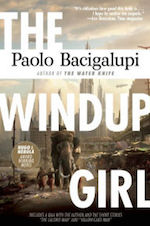 Here we encounter another world wrecked by flooding and eco-disasters, a world in which biological plagues wreak havoc on the population and strange, genetic experiments run wild (a population of feral Cheshire Cats). We are in the drowned world of 23rd century Thailand, a place that is powered (literally) by springs (check the title of the book). Food sources are controlled by vast global conglomerates (this one is just a fact of the modern world) and the last remaining seed bank is a treasure our protagonist will do anything to acquire. The Windup Girl might just be the future of agriculture or our present.
Here we encounter another world wrecked by flooding and eco-disasters, a world in which biological plagues wreak havoc on the population and strange, genetic experiments run wild (a population of feral Cheshire Cats). We are in the drowned world of 23rd century Thailand, a place that is powered (literally) by springs (check the title of the book). Food sources are controlled by vast global conglomerates (this one is just a fact of the modern world) and the last remaining seed bank is a treasure our protagonist will do anything to acquire. The Windup Girl might just be the future of agriculture or our present.
The Left Hand of Darkness by Ursula K. Le Guin
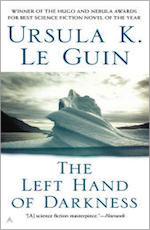 There is a point in the novel where the narrator, Genly Ai, wonders whether the peculiar nature of the people of Gethen—also known as Winter, the perpetually cold and snowy planet in Ursula K. Le Guin’s The Left Hand of Darkness—are a product of the extreme environment or some sort of genetic experiment long ago abandoned. We never discover the answer. Rather, Le Guin’s novel is a meditation on the nature of the Gethenites’ sexual identity. See, the people of Winter have no fixed sex. They shift from male to female in a cycle and choose partners to suit their current sex. Our narrator is an envoy, a man from another world trying to make first contact with Gethen. He is ultimately thrown out by one faction, embraced by another, betrayed, befriended, and saved. The novel concludes with one of the more memorable segments in science fiction, a month’s long journey across a glacier that leaves Genly (male) alone with Estraven (alternately male and female). The two are trapped, isolated as they move across the ice. In this private world we confront the notion of what it is to be a man or a woman and how we define our relationship between the two.
There is a point in the novel where the narrator, Genly Ai, wonders whether the peculiar nature of the people of Gethen—also known as Winter, the perpetually cold and snowy planet in Ursula K. Le Guin’s The Left Hand of Darkness—are a product of the extreme environment or some sort of genetic experiment long ago abandoned. We never discover the answer. Rather, Le Guin’s novel is a meditation on the nature of the Gethenites’ sexual identity. See, the people of Winter have no fixed sex. They shift from male to female in a cycle and choose partners to suit their current sex. Our narrator is an envoy, a man from another world trying to make first contact with Gethen. He is ultimately thrown out by one faction, embraced by another, betrayed, befriended, and saved. The novel concludes with one of the more memorable segments in science fiction, a month’s long journey across a glacier that leaves Genly (male) alone with Estraven (alternately male and female). The two are trapped, isolated as they move across the ice. In this private world we confront the notion of what it is to be a man or a woman and how we define our relationship between the two.
Dune by Frank Herbert
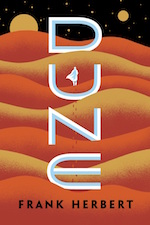 Arrakis, also called Dune, is a planet entirely devoid of surface water, a desert from top to bottom. And everyone who lives there—the native population, the fremen—is entirely focused on conservation and desert survival. The desert of Arrakis is merciless, but it’s also the only place in the universe where the spice, mélange, exists. Born of sandworms, the spice is a kind of catchall mystical, pseudo-scientific, quasi-religious super drug. Control of the spice equals control of the empire. And the spice is born out of this extreme environment, as are its spice-consuming, blue-within-blue-eyed population, the fremen. These folk are the true children of the desert. Their stillsuits turn every man or woman into a walking ecosystem, a self-sufficient, recycling machine in stylish brown leather. There are a hundred different reasons to praise Dune, but it was the severity of Herbert’s depiction of desert life that most struck me when I first read it.
Arrakis, also called Dune, is a planet entirely devoid of surface water, a desert from top to bottom. And everyone who lives there—the native population, the fremen—is entirely focused on conservation and desert survival. The desert of Arrakis is merciless, but it’s also the only place in the universe where the spice, mélange, exists. Born of sandworms, the spice is a kind of catchall mystical, pseudo-scientific, quasi-religious super drug. Control of the spice equals control of the empire. And the spice is born out of this extreme environment, as are its spice-consuming, blue-within-blue-eyed population, the fremen. These folk are the true children of the desert. Their stillsuits turn every man or woman into a walking ecosystem, a self-sufficient, recycling machine in stylish brown leather. There are a hundred different reasons to praise Dune, but it was the severity of Herbert’s depiction of desert life that most struck me when I first read it.
Solaris by Stanislaw Lem
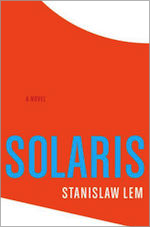 Okay, I saved this one for last because Stanislaw Lem’s Solaris gets the prize for most extreme world. Solaris, the eponymous planet, contains only one living organism. The planet wasn’t populated by a billion life forms that rose out of the ocean, rather the planet-sized ocean became a single life form. As the novel opens we learn that scientist have already spent decades studying the ocean. Volumes have been written about it. Generations have studied Solaris, but the ocean remains a mystery. The people of earth are unable to communicate with Solaris and it’s not for want of trying. Even the planet wants to communicate with humanity. It creates grand structures and humanoid figures, using mimicry to attempt communication. It doesn’t work. Contact is never achieved. Solaris is about the limitations of our species. It’s about trying to understand something that is completely different from you. It’s a contemplation of what is alien and thus human as well.
Okay, I saved this one for last because Stanislaw Lem’s Solaris gets the prize for most extreme world. Solaris, the eponymous planet, contains only one living organism. The planet wasn’t populated by a billion life forms that rose out of the ocean, rather the planet-sized ocean became a single life form. As the novel opens we learn that scientist have already spent decades studying the ocean. Volumes have been written about it. Generations have studied Solaris, but the ocean remains a mystery. The people of earth are unable to communicate with Solaris and it’s not for want of trying. Even the planet wants to communicate with humanity. It creates grand structures and humanoid figures, using mimicry to attempt communication. It doesn’t work. Contact is never achieved. Solaris is about the limitations of our species. It’s about trying to understand something that is completely different from you. It’s a contemplation of what is alien and thus human as well.
Originally published in July 2017.
 Michael Johnston has always been an avid reader of science fiction and fantasy. He studied architecture and ancient history at Lehigh University and earned a master’s degree in architecture from Columbia University. Michael worked as an architect in New York City before switching to writing full time. He is the co-author of the YA Heart of Dread trilogy with his wife, Melissa de la Cruz. His novel Soleri is available from Tor. He lives in Los Angeles with his wife and daughter. You can find him online at his website and on Twitter @MJohnstonAuthor.
Michael Johnston has always been an avid reader of science fiction and fantasy. He studied architecture and ancient history at Lehigh University and earned a master’s degree in architecture from Columbia University. Michael worked as an architect in New York City before switching to writing full time. He is the co-author of the YA Heart of Dread trilogy with his wife, Melissa de la Cruz. His novel Soleri is available from Tor. He lives in Los Angeles with his wife and daughter. You can find him online at his website and on Twitter @MJohnstonAuthor.










